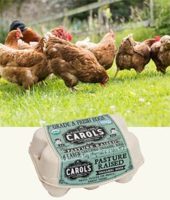Carol’s (Pete and Gerry’s)
They write: “On small New England family farms, from green-up in spring through autumn, our pasture-raised hens spend their days with plenty of seasonal, green grass to roam in, sunshine, and a cozy barn to sleep in at night. Providing chickens with enough seasonal pasture to thrive takes a lot of space, because they have to be moved from pasture to pasture regularly, to let the grass grow back. But the effort and cost is worth it for those that appreciate a truly amazing egg. Our hens enjoy wholesome certified organic feed that’s free of GMOs and pesticides, and pure, fresh water whenever they want it. They never receive hormones or antibiotics. Every time our hens go out to pasture, they boost their diet with nutritious foods they crave, like native grasses, seeds, insects and grubs. When you taste our delicious pasture-raised eggs, you’re getting a taste that could only come from our New England landscape. Each farm’s setting is a little different and the pasture changes with the seasons. That gives our eggs a distinct character and flavor that links them to the land they come from. You’ll love the taste!”
|
|
| Ownership Structure | 70 |
| Average Flock Size | 60 |
| Single or Double Henhouses | 100 |
| Other Certifications (bonus points) | 60 |
| Organic Certifier | 85 |
| Commitment to Organics | 80 |
| Indoor Space per Bird | 100 |
| Indoor Enrichments | 80 |
| Litter Management | 80 |
| Natural Light | 80 |
| Outdoor Space per Bird | 40 |
| Popholes/Exit to the Outdoors | |
| Outdoor Enrichments | 80 |
| Outdoor Space Exemptions | 70 |
| Outdoor Management System | 60 |
| Manure Handling System | 80 |
| Forced Molting | 100 |
| Beak Trimming | 70 |
| Laying Hen Lifespan | 60 |
| Use of Spent Hens | 100 |
| Death Loss Rate | 90 |
| Pullets | 80 |
| Pullet Access to Outdoors | 20 |
| Feed Produced on Farm | 50 |
| US Grown Feed | 70 |
| Soy in Feed | Yes |
| Synthetic Amino Acids | 70 |
| Disclosure Rate | 70 |


